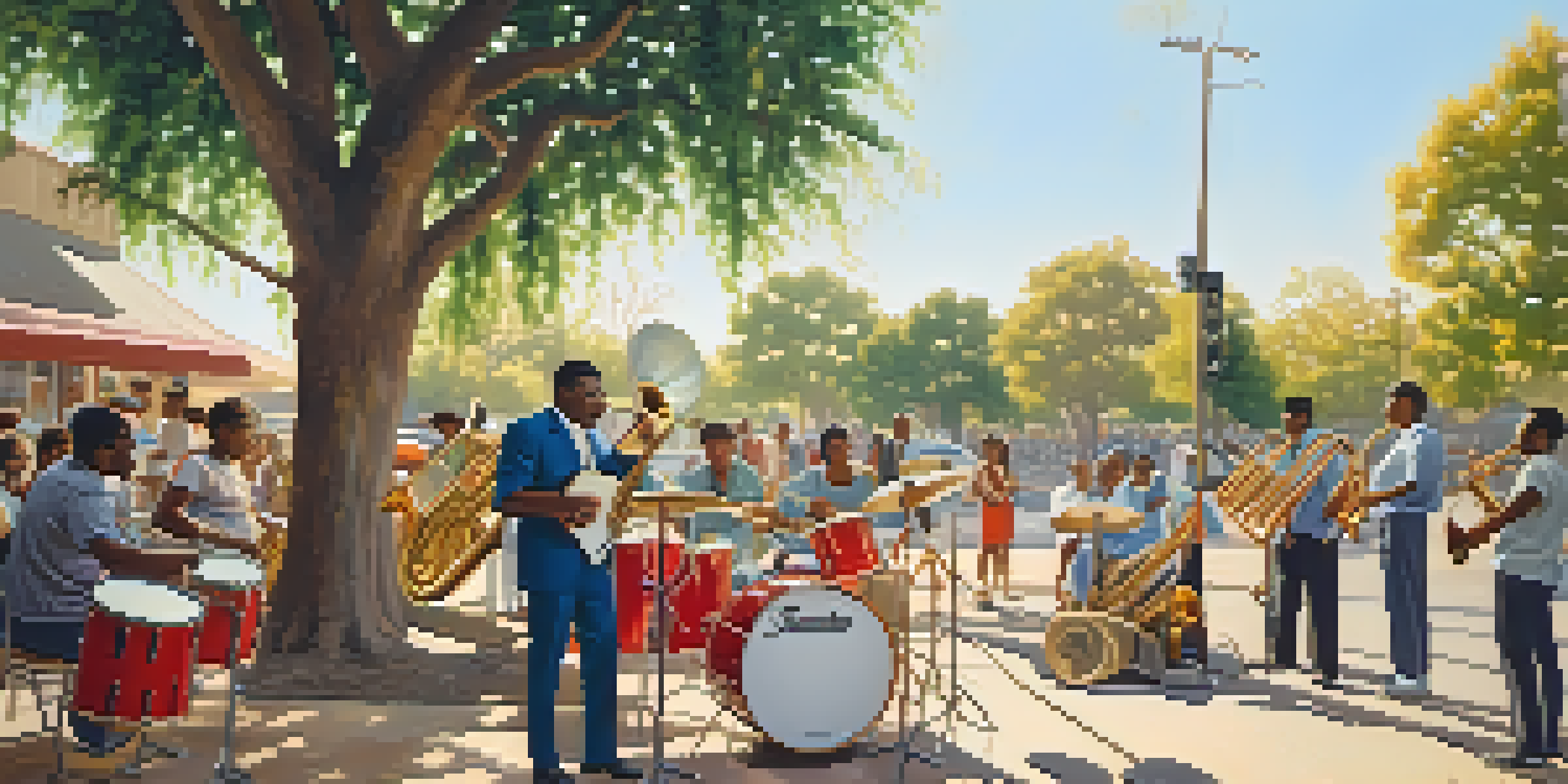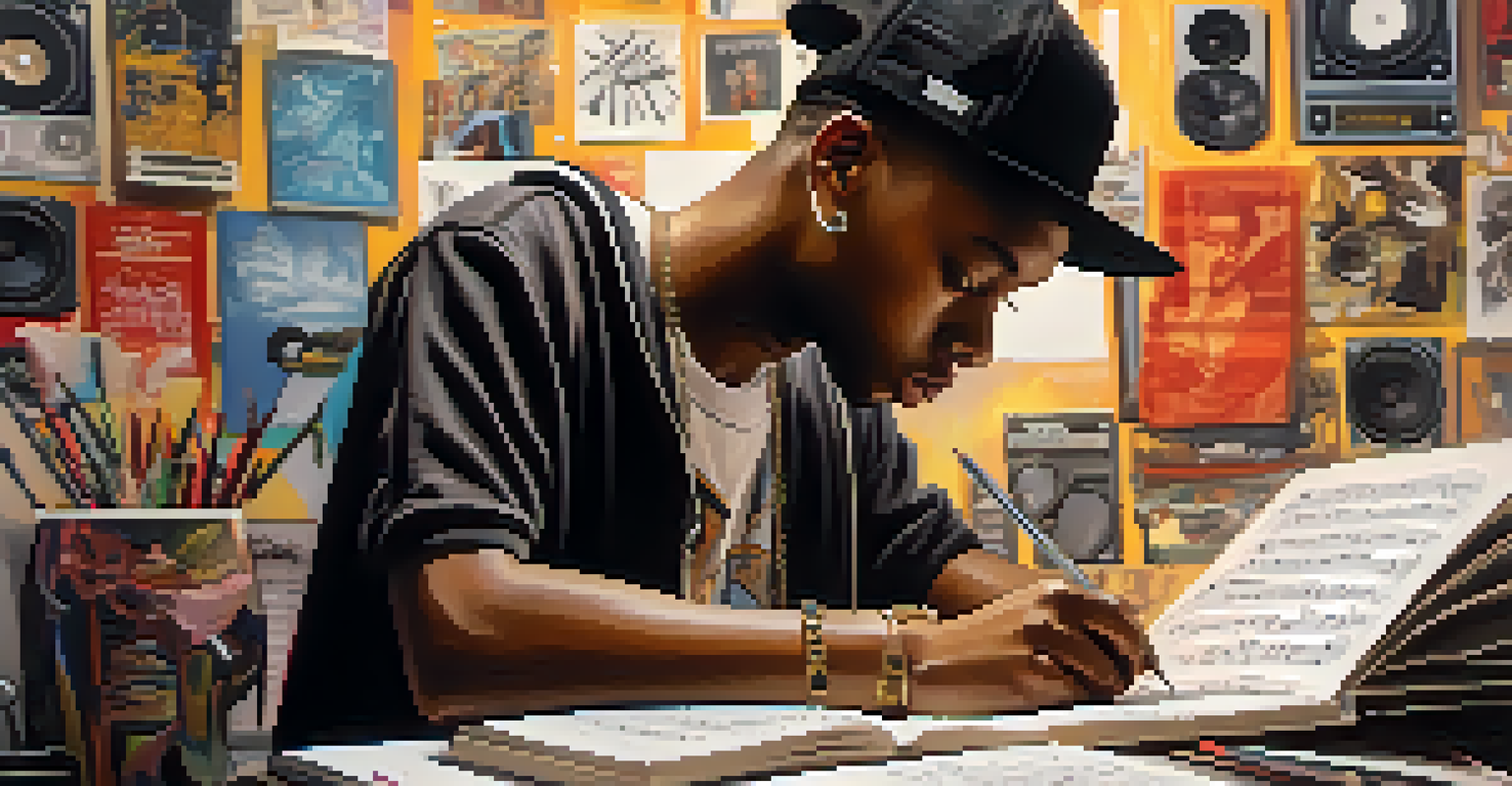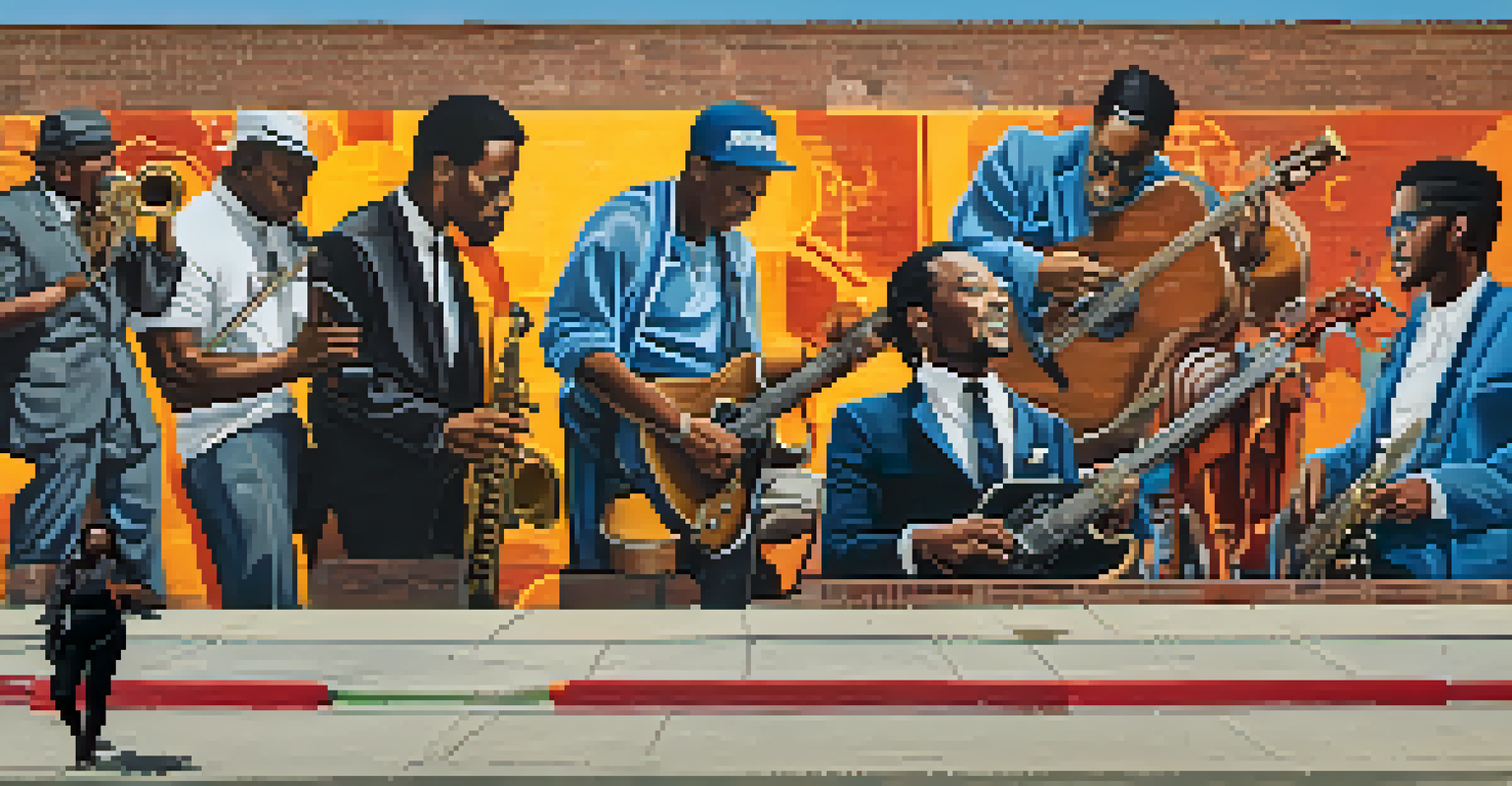The Impact of Music on Compton's Civil Rights Struggle

The Roots of Music in Compton's Culture
Compton's vibrant music scene has deep roots in African American culture, reflecting the community's struggles and triumphs. From jazz to hip-hop, music has provided a voice for the marginalized, serving as a powerful tool for expression. Local artists often draw inspiration from their surroundings, translating their experiences into melodies and lyrics that resonate with listeners.
Music is the weapon of the future.
In the 1960s and 70s, music became a means of documenting the civil rights struggle, capturing the spirit of the times. Musicians like Sam Cooke and Nina Simone used their platforms to address societal issues, influencing generations to stand up for justice. Their songs became anthems for change, sparking conversations that ignited movements beyond Compton.
The cultural impact of music in Compton cannot be overstated; it has evolved into a symbol of resilience. Each note and lyric has contributed to the narrative of the civil rights movement, illustrating the fight for equality and justice. In a city marked by its challenges, music has offered hope and unity among its residents.
Hip-Hop: The Voice of a Generation
As the civil rights movement progressed, hip-hop emerged as a vital form of expression in Compton. Artists like N.W.A and Ice Cube brought the struggles of their community to the forefront, using their lyrics to highlight issues like police brutality and systemic racism. Their raw storytelling resonated with many, making hip-hop a powerful vehicle for social change.

Through their music, these artists not only entertained but also educated listeners about the realities of life in Compton. Songs like 'F*** tha Police' became rallying cries, empowering individuals to speak out against injustices. This genre's impact extended beyond Compton, influencing youth across the nation to engage in activism.
Music as a Voice for Change
Compton's music scene has historically provided a powerful platform for expressing the community's struggles and advocating for social justice.
Moreover, hip-hop created a sense of community and solidarity among those facing similar struggles. It fostered a culture of resistance, encouraging listeners to unite and advocate for their rights. In this way, hip-hop not only reflected the civil rights struggle but actively participated in shaping its narrative.
Music as a Tool for Activism
Throughout Compton's civil rights struggle, music served as a strategic tool for activism. Benefit concerts and community events often featured local artists, amplifying messages of unity and resistance. These gatherings fostered a sense of collective purpose, empowering citizens to stand up for their rights.
The power of music can never be underestimated. It can inspire, it can unite, and it can change the world.
Moreover, songs became a means of raising awareness about critical issues affecting the community. Artists used their platforms to address topics such as housing discrimination and educational inequality, inspiring listeners to take action. Music not only documented the struggle but also mobilized individuals to fight for change.
In this way, music transcended entertainment; it became a call to action. The rhythms and lyrics motivated listeners to engage in protests and community organizing, blending art with activism. This synergy enriched the civil rights movement in Compton, illustrating how music can ignite social change.
The Role of Local Artists in the Movement
Local artists in Compton played a crucial role in shaping the narrative of the civil rights movement. Through their music, they captured the essence of the community's experiences, expressing the frustrations and aspirations of its residents. These artists often performed at rallies and events, intertwining their art with activism.
By sharing personal stories of struggle and resilience, these musicians connected with audiences on a profound level. Their songs became relatable narratives that resonated deeply within the community, fostering a sense of shared identity and purpose. This connection empowered listeners to embrace their voices and join the fight for equality.
Hip-Hop's Role in Activism
Artists like N.W.A and Ice Cube used hip-hop to raise awareness about systemic issues, inspiring a generation to engage in activism.
Additionally, many local artists collaborated with civil rights organizations, using their influence to advocate for change. Their contributions not only elevated the movement but also inspired new generations of musicians to engage in social issues. This legacy continues to thrive, showcasing the lasting impact of local artists in the civil rights struggle.
The Intersection of Music and Education
Music education has long been a vital aspect of Compton's community, fostering creativity and critical thinking among youth. Programs that emphasize musical training often serve as safe spaces for young people, enabling them to explore their identities and express their thoughts. These programs have historically linked music to broader social issues, reinforcing the importance of activism.
In many cases, local schools integrated civil rights themes into their music curricula, teaching students about the historical context of the struggles. By learning about the role of music in activism, students gained insight into the power of their own voices. This education inspired them to use music as a means of advocacy, extending the legacy of the civil rights movement.
Furthermore, the exposure to music and its history nurtured a sense of pride and empowerment among students. They learned that they could contribute to their community's narrative through their art. This connection between music and education continues to thrive, shaping future leaders who are passionate about social justice.
Legacy of Music in Compton's Civil Rights History
The legacy of music in Compton's civil rights history is profound and enduring. The songs and artists of the past have left an indelible mark on the community, shaping its identity and inspiring future generations. These musical contributions continue to resonate, reminding residents of their resilience in the face of adversity.
Today, Compton's music scene thrives, with new artists carrying the torch of activism through their lyrics. They draw from the rich history of those who came before them while addressing contemporary social issues. This evolution of music reflects the ongoing struggle for equality and justice, showcasing the power of art as a catalyst for change.
Legacy of Local Artists
Local musicians in Compton have shaped the narrative of the civil rights movement, connecting deeply with their community and inspiring future generations.
Moreover, the impact of music extends beyond Compton, influencing artists and activists worldwide. The stories told through song and verse have inspired movements across the globe, proving that music is a universal language of resistance. As Compton continues to evolve, its musical legacy remains a testament to the power of art in the fight for civil rights.
Looking Forward: Music's Role in Future Activism
As we look to the future, the role of music in activism remains crucial. With the rise of social media and digital platforms, artists now have unprecedented access to share their messages with a global audience. This means that the traditions established by Compton's musicians continue to evolve, adapting to the tools and technologies of today.
Emerging artists are increasingly using music to comment on current social issues, from systemic racism to climate change. They are blending genres and styles to create innovative sounds that challenge the status quo. This adaptability ensures that music will remain a relevant and powerful force in activism for years to come.

Ultimately, the legacy of Compton's music scene serves as a reminder that the fight for justice is ongoing. While the struggles may evolve, the power of music to inspire and unite remains unchanged. As new voices emerge, they will undoubtedly contribute to the narrative of activism, ensuring that the spirit of Compton's civil rights struggle lives on.